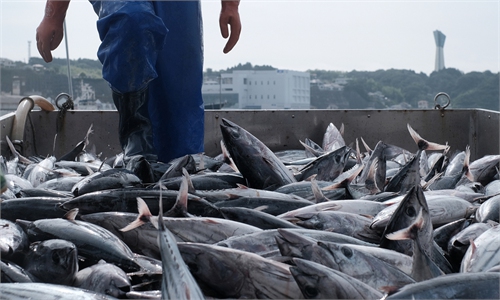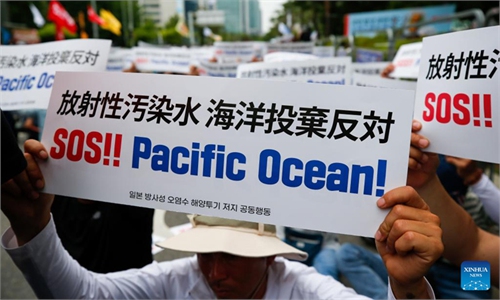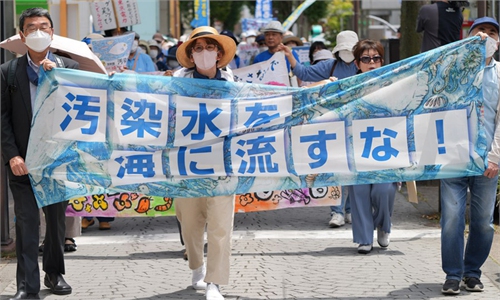China bans food imports from Fukushima, tightens scrutiny of seafood shipments from other parts of Japan
US, West urged not to connive with Japan’s erroneous plan
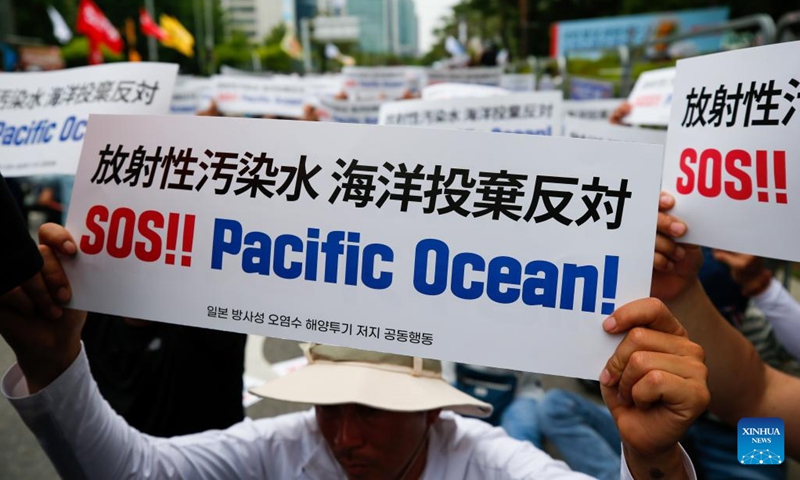
People rally to protest against Japan's planned discharge of radioactive wastewater in Seoul, South Korea, June 12, 2023. Thousands of South Korean fishermen gathered on Monday near the parliamentary building in Seoul to clamor against Japan's planned discharge of radioactive wastewater from its crippled Fukushima Daiichi nuclear power plant into the Pacific Ocean(Photo: Xinhua)
Japan's nuclear regulator granted approval on Friday for utility company Tokyo Electric Power Co (Tepco), which ran the crippled Fukushima Daiichi nuclear power plant, to start the country's controversial plan to dump a million tons of nuclear-contaminated wastewater into the ocean. On the same day, China, which has expressed its firm opposition to the plan, announced a continuation of its previous ban on imported food from Japan's Fukushima and nine other regions.
There are growing calls from Japan's neighboring countries and the international community for Japan to revoke its plan, with many people urging their own governments to ban food, especially aquatic products, imported from Japan and to take more actions to put political pressure on the Japanese government. The US, its allies and Western countries have also been urged not to connive with Japan's plan as geopolitical concerns should not outweigh international responsibilities and obligations to human health and global ecology.
On Friday, China's customs authorities announced a ban on food imports from Japan's Fukushima and nine other regions and said it will rigorously examine certificates for food imports, especially aquatic products, from the other non-banned prefectures as Japan continues pushing for its plan to dump the nuclear contaminated wastewater into the sea.
Chinese customs authorities also slammed the latest report by the International Atomic Energy Agency (IAEA) on Japan's dumping plan and said it "failed to fully reflect the opinions of all experts involved in the evaluation and the conclusions have not been unanimously recognized by all parties."
The IAEA report, which was released on Tuesday and claimed that Japan's plan was "consistent with international safety standards", has met with increasing questions and criticism in Japan and neighboring countries as it failed to respond to concerns over the safety of the plan.
While the Chinese government has reiterated its firm opposition to Japan's dumping plan, Chinese people have also been paying closer attention to related news, and calls for boycotting Japanese goods have emerged among the Chinese public in recent weeks, with particular emphasis on Japanese cosmetics and food products.
An executive at the China Fisheries Association, who asked for anonymity, told the Global Times on Friday that in response to Japan arbitrarily pushing forward the plan, he called for the suspension of China-Japan cooperation in fishery and related trade.
More countries have expressed concern over Japan's dumping plans. Former Papua New Guinean prime minister Peter O'Neill told the Global Times in an interview that they are disappointed as Japan still wants to go ahead and dump the nuclear-contaminated water into the Pacific, but people are not convinced by the reports that said Japan's plan was safe.
In South Korea, protests against Japan's dumping plan have continued for weeks in Seoul. However, the South Korean government on Friday announced its "own scientific analysis" of Japan's dumping plan and claimed it "meets international standards" as long as it is carried out as planned.
Some Chinese experts said they are not surprised to see the South Korean government reach such a conclusion, given that it is leaning toward the US and making active moves to strengthen relations with Japan and other US' Western allies.
Political needs have taken the better of the Yoon government, leading it to hastily release a report that has little to do with science but is all about politics, and to turn a blind eye to the rising concerns and opposition in South Korea and other countries, including China and Pacific Rim countries, Lü Chao, an expert on Korean Peninsula issues at the Liaoning Academy of Social Sciences, told the Global Times.
Although governmental officials have tried to persuade the public that it would take around four to five years and "up to 10 years" for Japan's nuclear-contaminated wastewater to reach South Korea's seas and that it would "not have any meaningful impact," South Korean people have not been convinced.
Media have reported since June that people in the country are snapping up sea salt and other items as worries grow over their safety, pushing the price of sea salt in South Korea to increase by 27 percent in June from two months ago.
Some protesters were seen wearing masks of South Korean President Yoon Suk-yeol and Japanese Prime Minister Fumio Kishida to express their anger toward the two leaders.
South Korean opposition lawmakers have also been stepping up pressure on the government to condemn Japan's plan. On Thursday, lawmakers from the main opposition Democratic Party started an overnight sit-in inside the National Assembly to protest the IAEA report and Japan's dumping plan.
By releasing the conclusion of its analysis on Friday, the South Korean government may also pave the way to lifting the ban on Fukushima food as Japan has endeavored to promote trade and business with South Korea, said Lü.
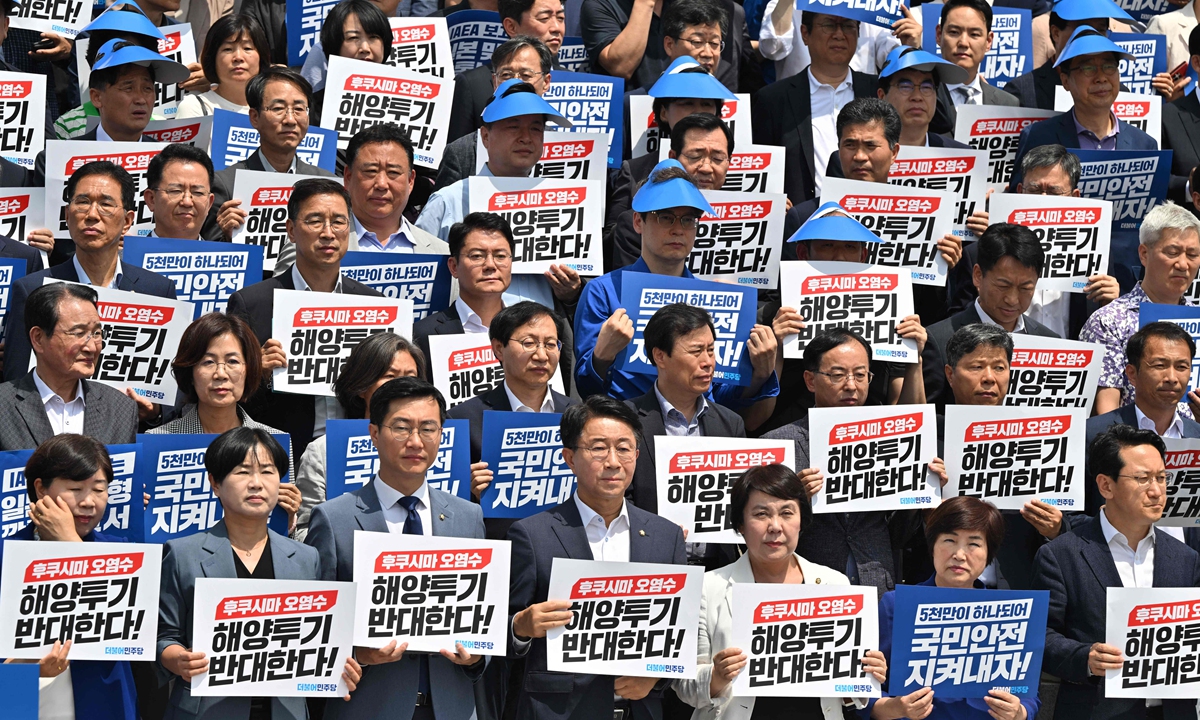
South Korea's main opposition Democratic Party lawmakers and party members hold placards reading "We oppose the dumping of Fukushima contaminated water into the sea" during a rally against Japan's plan to release treated water from the Fukushima nuclear plant, at the National Assembly in Seoul on July 7, 2023. Photo: VCG
Not justified
Neither the IAEA report nor the conclusion reached by the South Korean government can justify Japan's plan to dump the nuclear-contaminated wastewater into the ocean, as the plan has many problems, including its legitimacy, the long-term effectiveness of Japan's purification facility and the supervision system, analysts said.
Japan's plan and related assessment is based on the hypothesis that the nuclear-contaminated wastewater can meet safety standards after processing. But data previously released by Tepco showed 70 percent of the water failed to meet the standards after going through the purification system, known as ALPS, and 18 percent of the water exceeded the standard by 10 to 20,000 times, an expert who is familiar with Japan's dumping plan told the Global Times.
Moreover, the frequent malfunction of ALPS and its components and parts have also made the public question the company's ability in processing the nuclear-contaminated water, said the expert.
Another anonymous expert on nuclear safety told the Global Times that the nuclear radiation safety standards for people set by the IAEA is limited to 1 millisievert a year, while the risk of exposure to radiation still exists even below this threshold.
This is similar to not being safe while driving on the expressway within the speed limit, said the expert, who added that if Japan does not dump the nuclear-contaminated wastewater into the sea, we will not have to face these extra risks.
As the Fukushima accident and the disposal of the nuclear-contaminated wastewater are challenges to human health and the global ecology, and its severity may exceed that of the Chernobyl nuclear accident, the Japanese government should not unilaterally push the plan, analysts said.
They also criticized the indulgent attitude shown by the US and some Western countries toward the plan.
The US' act of connivance also comes out of political concerns as it needs Japan to cooperate with its "Indo-Pacific Strategy", and Western countries are also remaining silent despite their previous high-profile advocacy for environmental protection, fully exposing their double-standards, said Lü.
The US and Western countries should abandon their "ostrich policy" as Japan's plan to dump the nuclear-contaminated wastewater into the sea would have an irreversible impact on the global ecology and people's health, which should raise great concerns not only from Japan's neighboring countries, but also the entire international community, Lü said.

